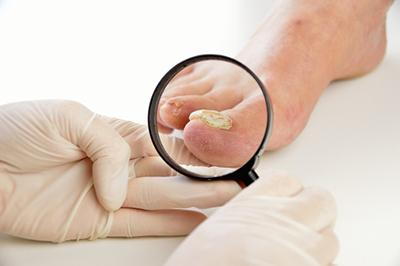Fungal Nail Infections: Causes, Treatment, and Prevention Tips
posted: Oct. 10, 2023.

Going barefoot in damp places, such as public pools or locker rooms, increases the risk of developing toenail fungus. Common signs of a fungal nail infection include discoloration or thickening of the toenails. Dr. Kent DiNucci, the experienced podiatrist at The Ankle and Foot Clinic in Omaha, NE, treats toenail fungus and can help you take steps to prevent it from coming back.
Signs of a Fungal Nail Infection
Several signs can develop when the nails are infected by fungus. Some signs of a fungal infection of the nails include:
- Yellowing of the nails
- Thickening of the nails
- White patches on the nails
- Darkening of the skin beneath the nails
- Brittle nails that flake easily
- Loose toenails
Causes of Fungal Nail Infections
Many factors can contribute to the development of a fungal nail infection. Common risk factors for and causes of toenail fungus include:
- Going barefoot in damp, public places (e.g., pools, gym locker rooms)
- Direct contact with someone who has any type of fungal infection
- Not removing wet socks and shoes right away
- Sharing nail clippers and other toenail tools
- Not keeping the feet clean and dry
- A weakened immune system
Fungal Nail Treatments
Fungal nail infections are difficult to self treat at home so it is best to see a doctor as soon as possible to prevent the infection from spreading. The skilled podiatrist at our clinic in Omaha, NE, treats nail fungus using various methods and will develop an individualized treatment plan tailored to your needs. Some of the options for treating toenail fungus include:
- Oral anti-fungal medications
- Medicated nail creams or polish
- Removal of the infected nails
- Laser treatment
Prevention Tips
There are steps you can take to help prevent a fungal nail infection from developing. Some helpful prevention tips include:
- Keeping the feet clean and dry
- Wearing well-fitting shoes that are not too tight
- Removing socks and shoes immediately if they get wet
- Wearing protective footwear, such as sandals, at public pools or in locker rooms
- Disinfecting nail clippers and other instruments after each use
- Not sharing nail clippers or other instruments with anyone else
- Never sharing shoes or socks with others
If you have signs of a fungal infection on your toenails, we can help. Schedule an appointment with Dr. DiNucci to discuss the options for treating nail fungus by calling The Ankle and Foot Clinic in Omaha, NE, at (402) 331-0221.